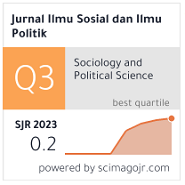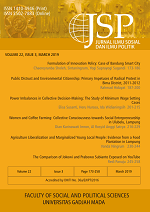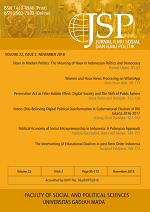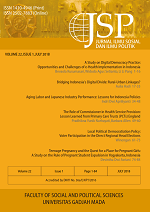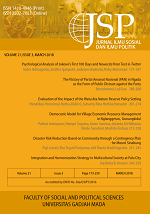The Study of Government’s Role for Welfaring Rubber Farmer in The Globalization Vortex
Pahrudin HM(1*)
(1) Department of Political Science, Faculty of Social and Political Sciences, Jambi University.
(*) Corresponding Author
Abstract
Rubber is a type of plant that has been cultivated by the people of Indonesia for long a time. Until now, farmers have become the largest party to cultivate rubber in Indonesia (85.10%) and contribute greatly to the nation’s economy, but are still far from prosperous. Rubber products produced by farmers are priced cheap so that they incomes are very small and create income inequality. As an export commodity, rubber is highly dependent with overseas which determines the price. In this context, the government through the bureaucratic system serves to produce a series of innovative-solutive development program in order to keep the people from the negative impacts of globalization. This effort can be run by the government with adopting The New Public Service Paradigm as part of efforts to better public services for the people. It is implementation in the form of domestic rubber needs priorities, bringing the industry to the center of rubber, training of rubber farmers, and improvement of transportation infrastructures.
Keywords
Full Text:
PDFReferences
Amal, A. S. (2011). Pemanfaatan getah karet pada aspal Ac 60/70 terhadap stabilitas Marshall pada Asphalt Treated Base (ATB). Media Teknik Sipil, 9(1), 8 – 16.
Amin, S. (2001). Imperialism and globalization. Journal Monthly Review, 5(11), 157-168. Badan Pusat Statistik (2014). Indonesia dalam angka. Jakarta.
Badan Pusat Statistik. (2014). Statistik karet Indonesia. Jakarta.
Badan Pusat Statistik. (2014). Statistik karet Indonesia. Jakarta.
Bappebti. (2015). Daftar harga komoditas di Indonesia. Jakarta: Kementrian Perdagangan RI.
Bello, W. (2004). Deglobalization: Ideas for a new world economy. New York: Zed Books.
Bryan, L. & Farrell, D. (1996). Market unbound: Unleasing global capitalism. New York: John Wiley.
Chakrabarty, D. (2000). Provincializing Europe. London: Routledge.
Denzin, N. K. & Lincoln, Y. S. (2009). Introduction:entering the field of qualitative research. In N. K. Denzin & Y. S. Lincoln. (Eds.). Handbook of Qualitative Research. Thousand Oaks, CA: SAGE.
Dernhart, J. V. & Dernhart, R. B. (2003). The New Public Service: Serving, Not Steering. New York: M.E Sharpe.
Fajriah, L., R. (2016). Penggunaan karet lewat instruksi Presiden. Retrieved from http:// ekbis.sindonews.com/read/1066625/34/ kemendag-dorong-penggunaan-karet- lewat-instruksi-presiden-1449150438.
Friedman, T. (2007). The world is flat: A brief history of the twenty-first century. New York: Picador.
Giddens, A. (1990). The consequences of modernity. California: Stanford University Press.
Giddens, A. (2002). Runaway world: How globalization is re-shaping our lives. London:Profile Books.
Glienmourinsie, D. (2016). Menperin Dorong Industri Ban Ekspansi ke Hulu. Retrieved from http://ekbis.sindonews. com/read/1056636/34/menperin-dorong- industri-ban-ekspansi-ke-hulu-1445942850.
HM, Pahrudin. (2014). Relasi patronase dalam perkebunan karet rakyat. Jurnal Sosiologi “Reflektif”, 8(2), 195-215.
Jati, W. R. (2012). Ketimpangan utara-selatan dalam globalisasi. Jurnal Studi Hubungan Internasional, 2(2), 83-101.
Jati, W. R. (2013). Memahami globalisasi sebagai evolusi kapitalisme. Jurnal Global dan Strategis, 7(2), 241-258.
Lindayanty. (2013). Jambi dalam sejarah 1500- 1942. Jambi: Dinas Kebudayaan dan Pariwisata Provinsi Jambi.
Loadman, J. (2005). Tears of the tree: the story of rubber – a modern marvel. New York: Oxford University Press.
Locher-Scholten, E. B. (2002). Berdirinya kekuasaan kolonial di Jambi: partai ganda politik & ekonomi. Fondasi Historis Ekonomi Indonesia. In J. Thomas Lindblad (Ed.). Yogyakarta: Pusat Studi Sosial Asia Tenggara UGM-Pustaka Pelajar.
Marvasti, A. B. (2004). Qualitative Research in Sociology. London: SAGE Publications.
Mitrović, L. (2010). The new bourgeoisie and its pseudo-elite in the societies of peripheral capitalism (a sketch for a sociological portrait). Facta Universitatis Series: Philosophy, Sociology, Psychology and History, 9(1), 1-13.
Murshed, S., M. (2002). Globalization, marginalization, and development. London: Routledge.
Napitupulu, D. (2011). Kajian tata niaga karet alam: Upaya peningkatan kesejahteraan petani. Jurnal Penelitian Karet, 29(1), 79-92.
Padmo, S. (2004). Perusahaan tanaman karet di Sumatera Timur, bunga rampai sejarah sosial-ekonomi Indonesia. Yogyakarta: Aditya Media-Fakultas Ilmu Budaya Universitas Gadjah Mada.
Petras, J. & Veltmeyer, H. (2001). Globalization unmasked: Imperialism in 21st century. London: Fernwood Publishing and Zed Books.
Pratiwi, D., A. (2016, July 28). Aspal dicampur karet kuali tasnya lebih tahan lama. Retrieved from http://economy.okezone. com/read/2015/04/09/320/1131761/aspal- dicampur-karet-kualitasnya-lebih-tahan- lama.
Ritzer, G. (2006). The globalization of nothing: Mengkonsumsi kehampaan di era globalisasi. Yogyakarta: Universitas Atma Jaya.
Rulyantie, S. (2011). Studi implementasi kebijakan program revitalisasi perkebunan di Provinsi Kepulauan Bangka Belitung. (Unpublished master’s thesis). Magister Administrasi Publik Universitas Terbuka.
Shiva, V. (2004). Peraturan pertanian WTO: ancaman bagi para petani dunia ketiga. Globalisasi, kemiskinan dan ketimpangan. International Forum on Globalization (IFG). Yogyakarta: Cindelaras Pustaka Rakyat Cerdas.
Steger, M. B. (2002). Globalism: The market ideology. Boston: Rowman and Littlefield.
Sunarti. (2011). Tingkat Kesesuaian Lahan di DAS Batang Bungo Untuk Tanaman Karet. Jurnal Hidrolitan, 2(2), 16-25.
Winarno, B ud i (2005). Gl o b a l i sa si wuj ud imperialisme baru: peran negara dalam pembangunan. Yogyakarta: Tajidu Press.
Wolf, M. (2005). Why globalization works. New Haven: Yale Notabene.
Wolf, M. (2016). Will the nation-state survive globalization? Retrieved from https://www. foreignaffairs.com/articles/2001- 01-01.
Wulandari, D. (2016). Aspal karet: tahun depan mulai diterapkan. Retrieved from http://industri. bisnis.com/read/20160412/45/537204/aspal- karet-tahun-depan-mulai-diterapkan
Article Metrics
Refbacks
- There are currently no refbacks.
Copyright (c) 2017 Jurnal Ilmu Sosial dan Ilmu Politik

This work is licensed under a Creative Commons Attribution-NonCommercial-NoDerivatives 4.0 International License.







